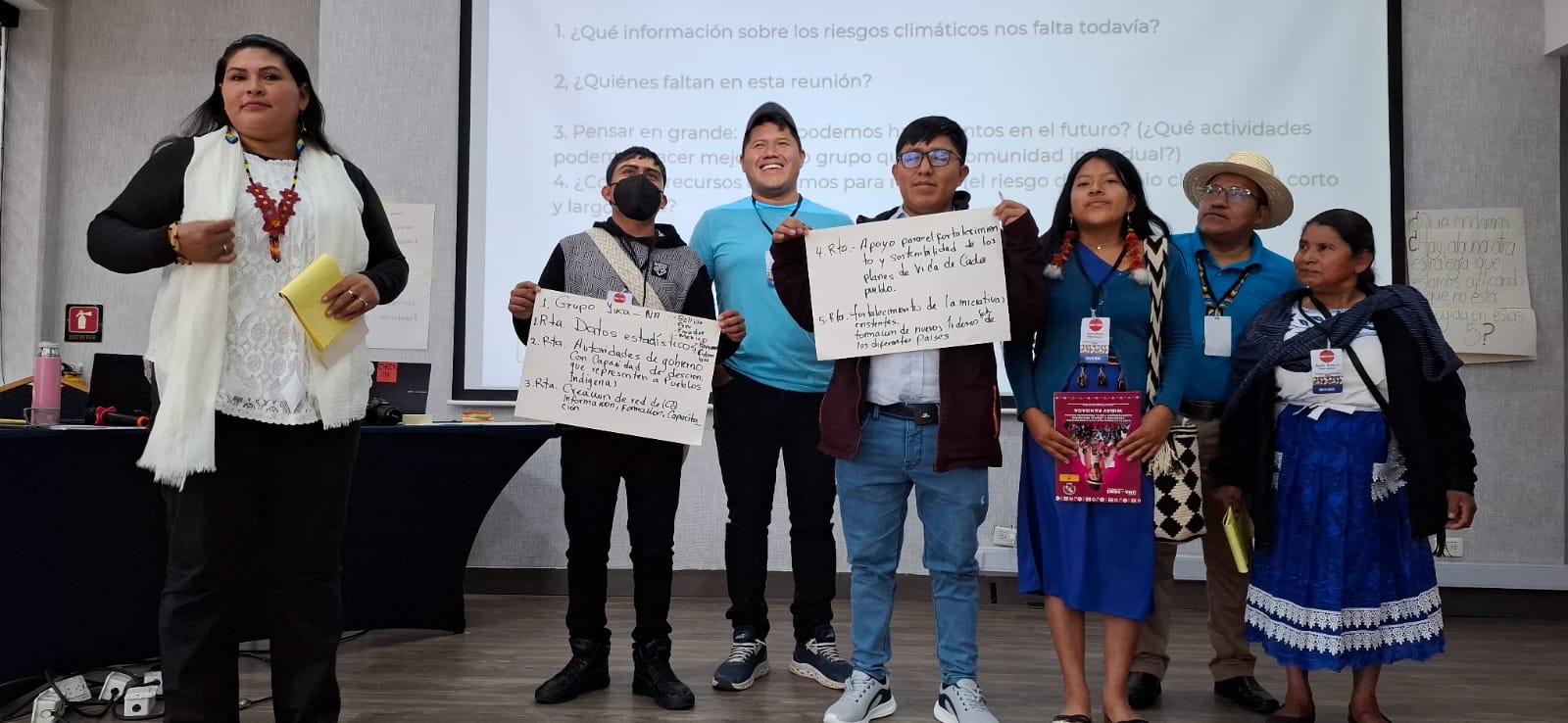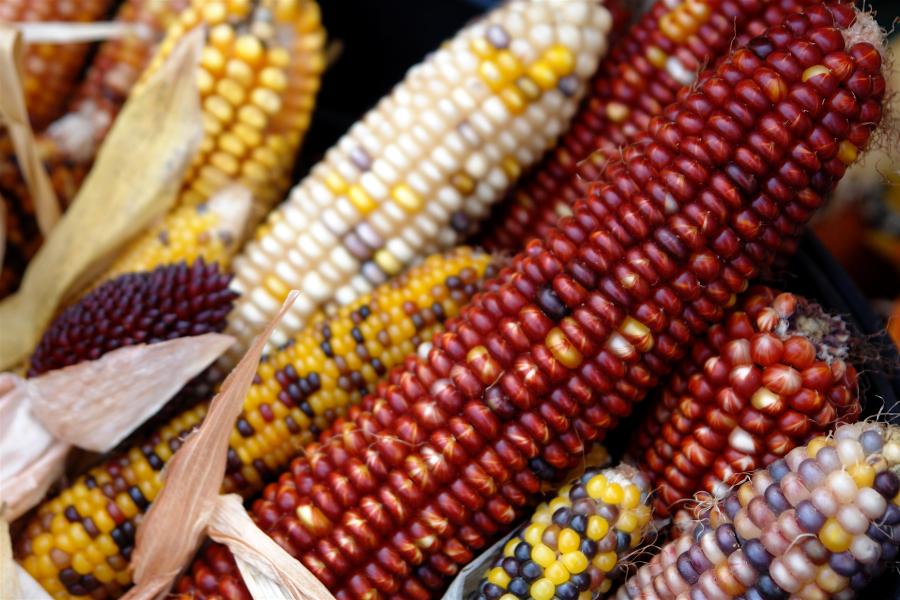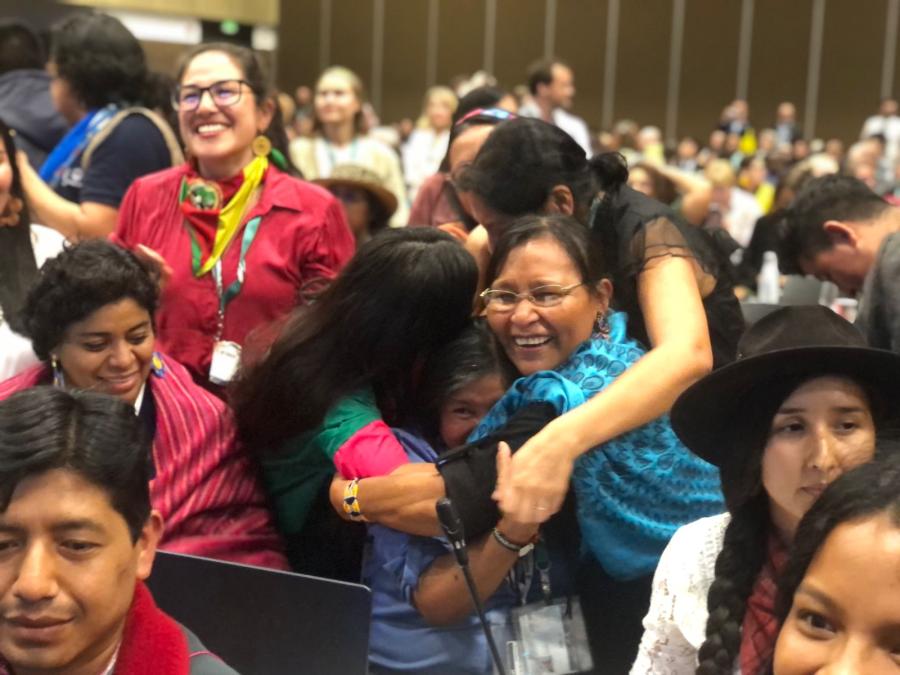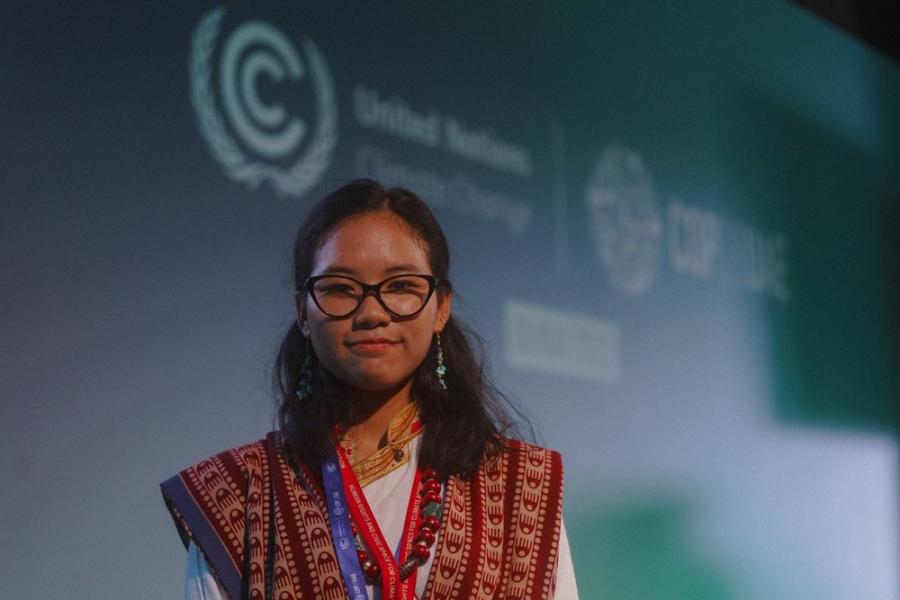
By CS Staff Rosy Sul González (Maya Kaqchikel), Verónica Aguilar (Mixtec), and Cesar Gomez (Maya Pocomam)
Climate change is accelerating worldwide, and Indigenous communities are experiencing the impacts and risks most acutely due in large part to their close relationship with Mother Earth and their status as stewards and protectors of the land.
Given the immediacy of this reality, Cultural Survival convened the First Meeting on the Impact and Risks of Climate Change in Bogota, Colombia from January 24-26, 2025. The meeting was a space for Indigenous communities to share experiences of adaptation and mitigation of climate risks and compile their recommendations to strengthen their livelihoods. Participants included Indigenous authorities, community radio stations, and territorial defenders from Peru, Mexico, Panama, Colombia, Bolivia, Ecuador, and Guatemala.
Indigenous communities are not passive in the face of this global crisis. By recovering ancestral knowledge and sustainable practices, they are actively mitigating and adapting to climate change. Such practices include traditional agricultural methods, reforestation, and water conservation techniques, along with essential communication methods within their communities that offer a more holistic approach. Many communities are reclaiming their ancestral role as stewards of the land, developing innovative solutions that are both environmentally sustainable and culturally meaningful. For example, Indigenous Peoples discovered that the sun’s and moon's energy influence Mother Earth's elements and created the lunar and solar calendar, which governs agricultural cycles along with various celebrations and ceremonies. Seeds are selected, planted, and harvested according to these calendars, strengthening the crops and Mother Earth.
Cultural Survival hosted a space for dialogue and exchange where partners could share their experiences and learn more about the risks of climate change. Grandmother and leader Ofelia Dutcha Kuyuedo (Múrui-Muina), a member of the Indigenous council of the Ziona Amena community of Colombia, opened the gathering with an ancestral ceremony. She invoked the energies of the grandmothers and grandfathers to guide the space of thought during the three days of the workshop, thanking Mother Earth for the bounty she gives us every day and reflecting on the care and protection of the territories. Afterward, she shared traditional food and drink from her community.
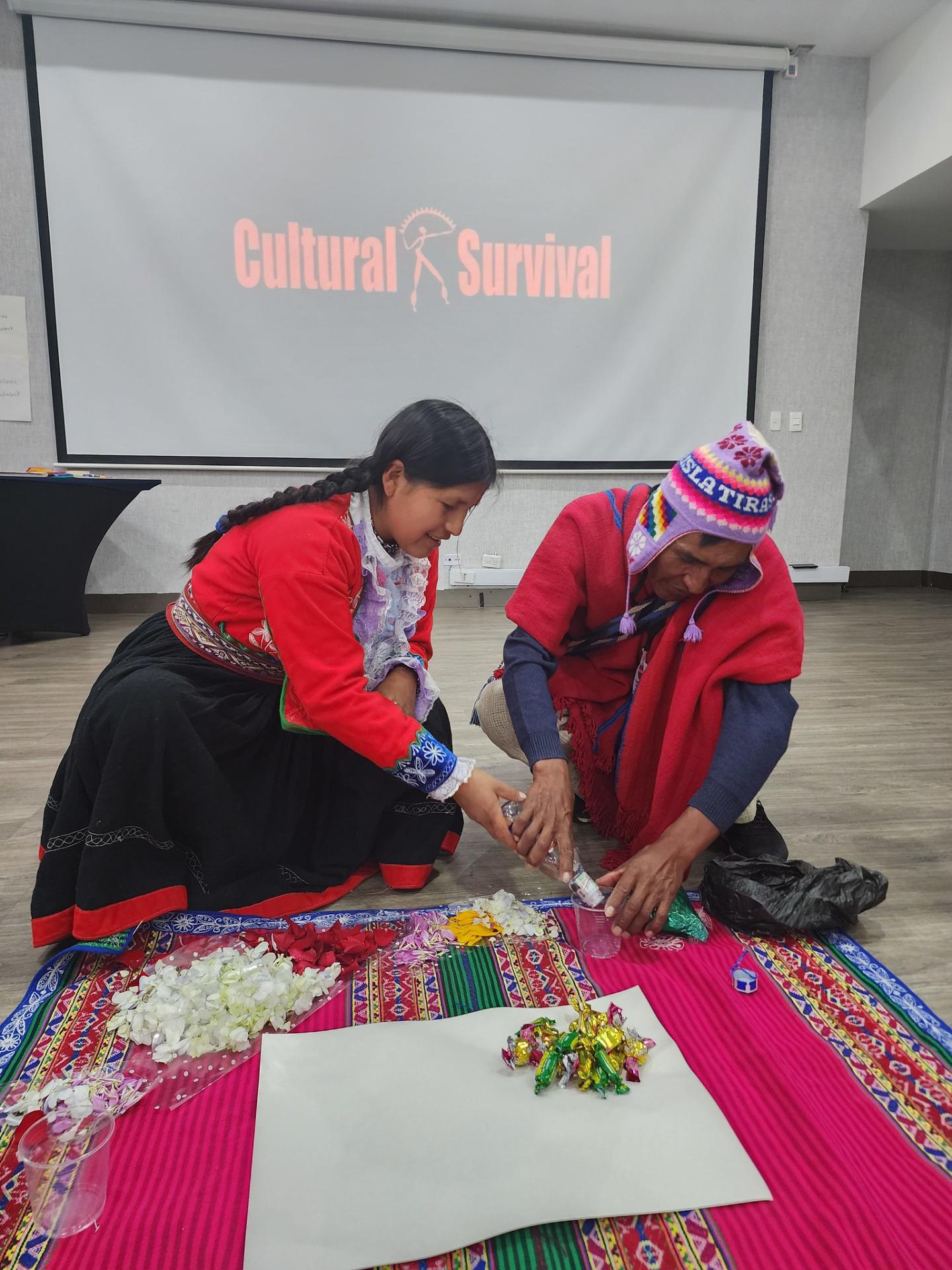
Identifying Common Problems and Risks
Consultants from Crescendo International, who also moderated the event, presented their research findings on the impact of the climate crisis at the global and community levels. They found that industrial development, deforestation, and pollution are having the most negative impact on Indigenous Peoples, who are already experiencing drastic climate changes in their territory. For example, rainy seasons are no longer predictable and extreme temperatures are causing loss of biodiversity, health issues, and agricultural losses.
These problems, in turn, negatively impact food security, which often leads to forced migration and increased poverty. Mining and other extractive activities that damage ecosystems are also seen as growing threats to territorial sustainability.
To deepen their understanding of the findings of the climate crisis, participants formed working groups where they exchanged opinions on the causes and effects they are facing in their territories. "We are not the ones who cause damage to the land, but we are the ones who are working to repair our communities," said Rafael Arturo Acuña (Tacana) from BoliviaEcuanasha Indigenous Radio and Television in Bolivia.
Federico Avendaño (Ñuu Savi), member of the Commission for Community Wealth, San Mateo Etlatongo, Mexico, said, "We Indigenous Peoples must now move on from complaints to concrete actions to mitigate the effects of climate change."
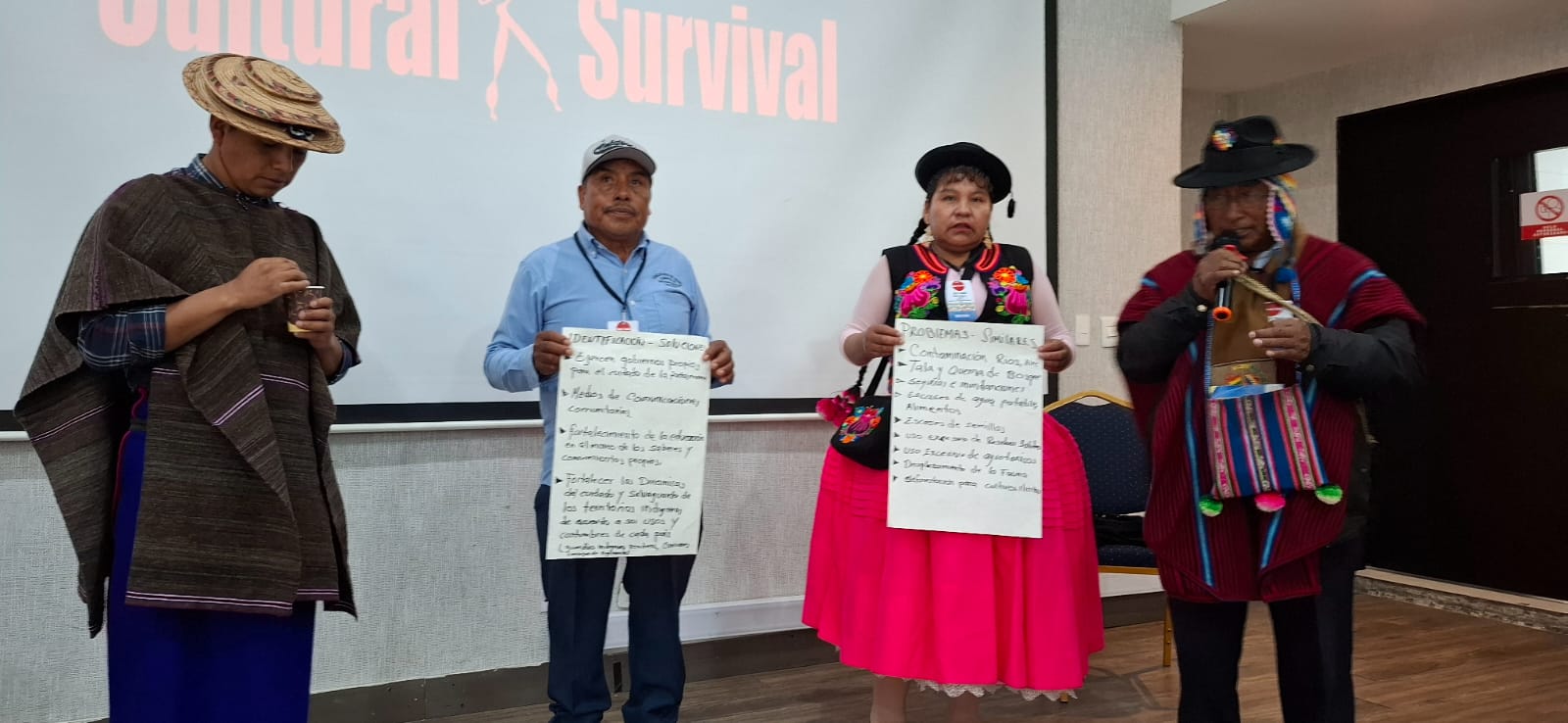
Common themes emerged at the meeting on the causes that are aggravating the climate crisis, from logging and mining activities to the lack of functional political systems to finance and ensure preparation, mitigation, or adaptation solutions. Current political systems frequently criminalize territorial defenders, further contributing to the climate crisis. Indigenous defenders are being persecuted, imprisoned, and even killed for their activism and actions in defense of their lands and natural resources.
There are other similarities among the countries of the region, such as droughts, migration, food shortages, loss of biodiversity, and health problems, while individual territories experience the loss of native seeds, medicinal plants and other local biodiversity, and soil degradation.
The most significant risk that the communities identified in the face of climate change is drought, which is severely affecting water availability and agriculture. Floods and extreme weather events are also considered potential threats, as they contribute to loss of biodiversity and disruption of agricultural cycles, affecting food security. These risks not only impact Indigenous Peoples’ livelihoods, but also their health and social dynamics, increasing disease and forced migration.
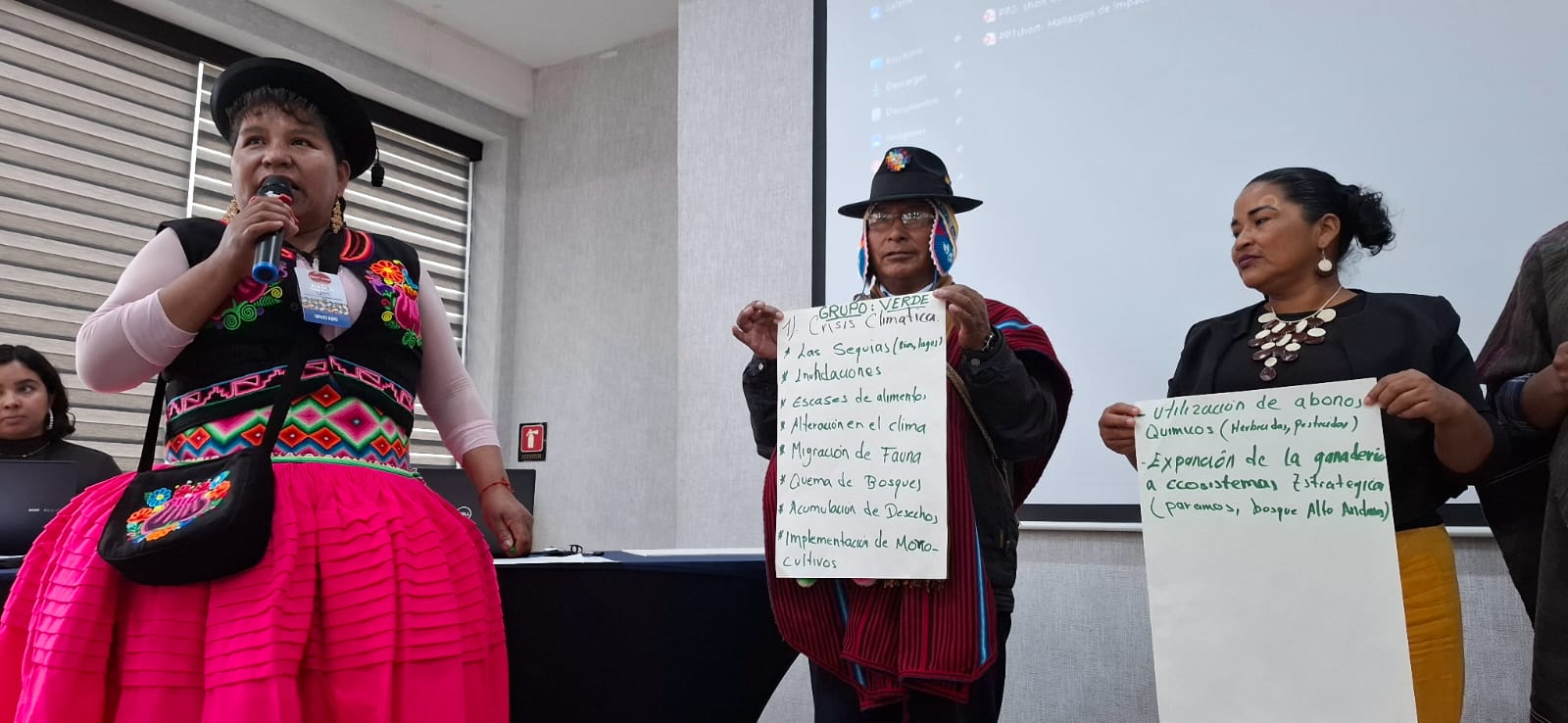
Strategies to Address Climate Change at the Global and Community Level
The challenges that Indigenous Peoples face in addressing climate change in international arenas were also analyzed. The United Nations Convention on Biodiversity Conference of the Parties (CBD COP) is composed of States that meet yearly to adopt decisions to combat climate change, but Indigenous Peoples and their concerns are only marginally considered in these discussions, if at all.
Silvia Ruiz (Nasa), a member of the Regional Indigenous Council of Cauca, shared her organization's experience of participating at CBD COP16, held last year in Colombia. "We had no experience in this type of event, we were too few to participate in many parallel events, and we did not know how the documents were negotiated,” she said. “Many countries said they did not have Indigenous Peoples and did not accept our proposals. Unfortunately, we saw that only 33 countries out of 196 have submitted their biodiversity action plans."
After Ruiz spoke, the working groups reconvened to discuss what Indigenous Peoples propose as a solution to the climate crisis and what measures are being developed locally to address these impacts. The participants agreed that there must be a clear and precise definition of climate change and culturally relevant systems to understand the problem and find community solutions, such as ensuring continuity with agroecological practices, diversifying reforestation, strengthening of seed banks, and use and respect for Traditional Knowledge in the care of the territories. Some visionary ideas also emerged, such as creating an environmental political training school—a measure that some communities already have in their long-term plans.
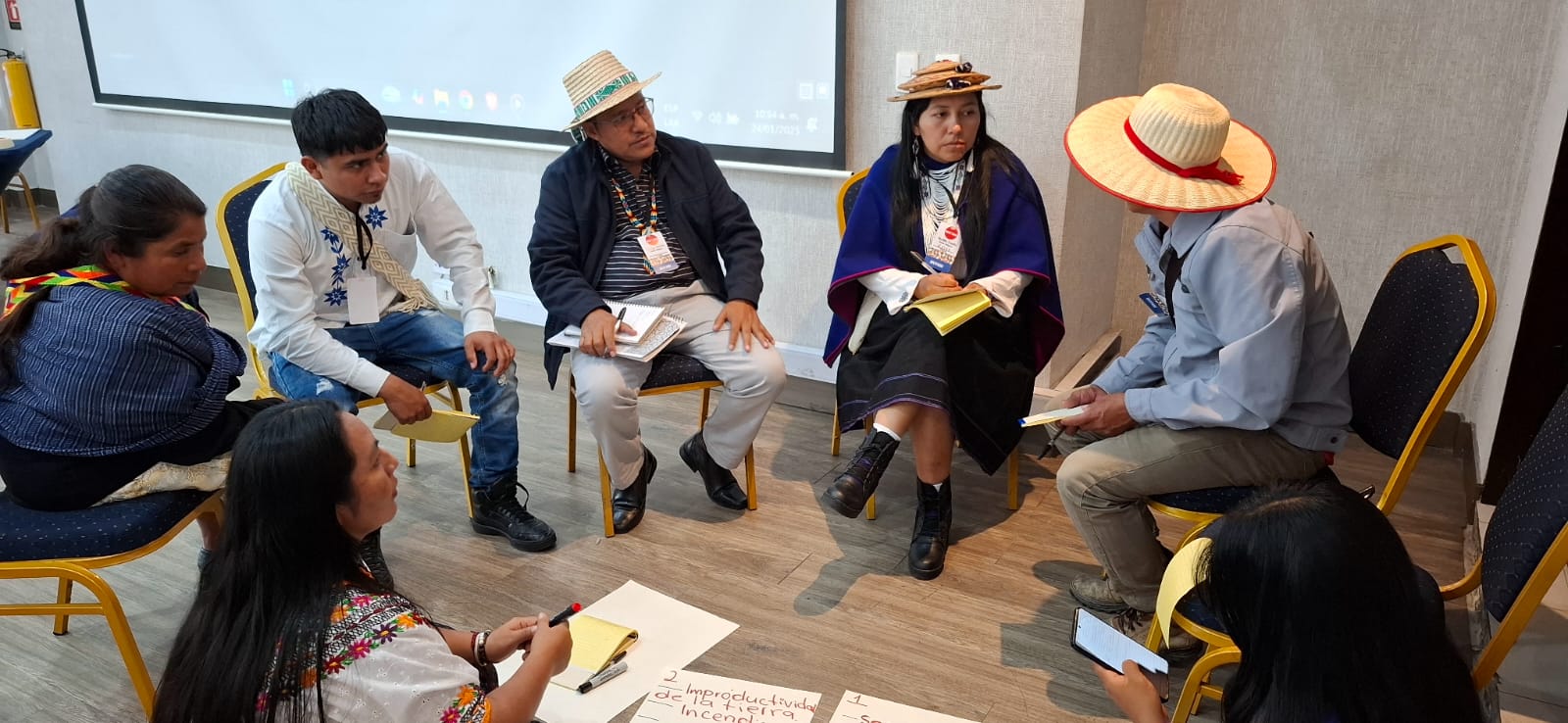
Without land rights and legal protections, Indigenous climate solutions will remain vulnerable. A call was made for international advocacy and stronger legal frameworks to safeguard Indigenous territories.
Ana Chen (Maya Q'eqchi'), community communicator of Radio Xyaab' Tzuultaq'a from El Estor Izabal, Guatemala, shared her experience and role as an Indigenous woman in the communication space. She said that the women communicators in her community have been involved in documenting and producing informative radio spots on the effects and solutions to climate change, primarily focusing on creating informative programs on communities’ right to a consultation process, and that the women communicators in her region have played a fundamental role in denouncing the violation of their rights by mining and other extractive companies.
For Chen and the rest of the communicators who have been repressed and criminalized by the mining sector, it has been a challenge to exercise their right to freedom of expression. "It is not easy to communicate injustices, but it is our duty as communicators. If we want a better future for the new generations, we must make use of this tool of defense that is radio," she said.
Communication has been vital in organizing the community and strengthening their knowledge systems. Several Indigenous communicators who presented at the event conducted interviews with other attendees on the topic of climate change, with some broadcasting live for their communities in their languages. Others recorded information on the development to edit and broadcast later and eventually share with their networks.
Other methodologies that were shared include traditional practices for restoring water sources and forests. Partners from the Tiquipa community in Bolivia explained how they are restoring the flow of the Kataria River and water level of Lake Titicaca. There was an emphasis on preserving ancestral knowledge of ecosystems and adapting lunar calendars due to the change in ecological cycles. Participants emphasized the need for direct funding for Indigenous-led climate initiatives and self-determined funding models that respect Indigenous governance systems.
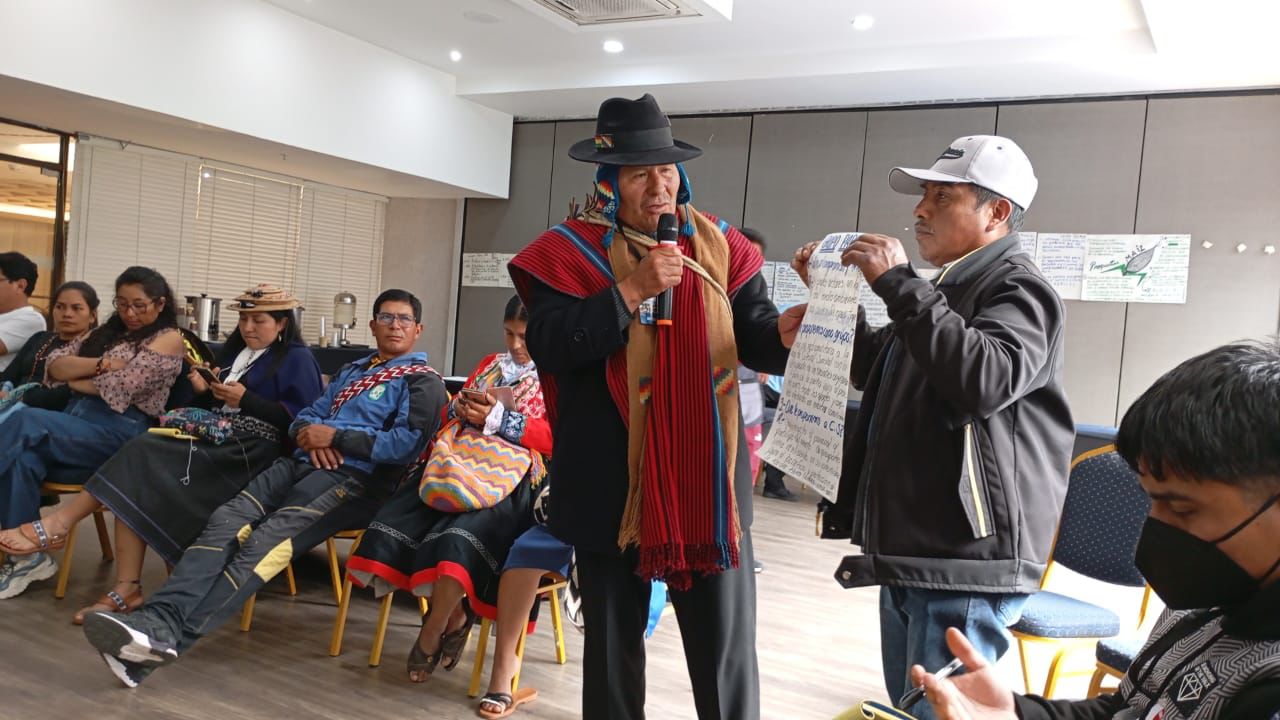
Collective Agreements and Commitments for the Near Future
In the final part of the exchange, the working groups were invited to ask themselves what they can do about the future on climate change, what commitments they could take away from this meeting to their countries and communities, and what they propose to continue communication and collaborative work. Participants reflected on the collective need to return to their communities and continue the work based on what they had learned in this meeting, highlighting the strengthening of community networks and applying shared lessons as crucial steps.
One of the concrete proposals was the creation of a network of Indigenous communicators and advocates to share reports and documents related to the climate crisis and the participation of Indigenous Peoples in advocacy spaces at the national and international levels. "To confront the climate crisis, we must listen, learn, and share at these gatherings. We must not victimize ourselves because of our situation, but rather continue our struggles,” Avendaño said.
Communities recognized that they face similar climate-related challenges of water scarcity, biodiversity loss, deforestation, and extreme weather events. However, they also felt that each community's experience is shaped by unique environmental, social, and political factors. Many communities are reclaiming and reinforcing Traditional Ecological Knowledge in response to climate change through strategies such as agroforestry, recovering the use of the lunar calendar during planting, community water conservation, and seed saving. The meeting reaffirmed that Indigenous communities are innovators of sustainable and culturally rooted climate solutions.
